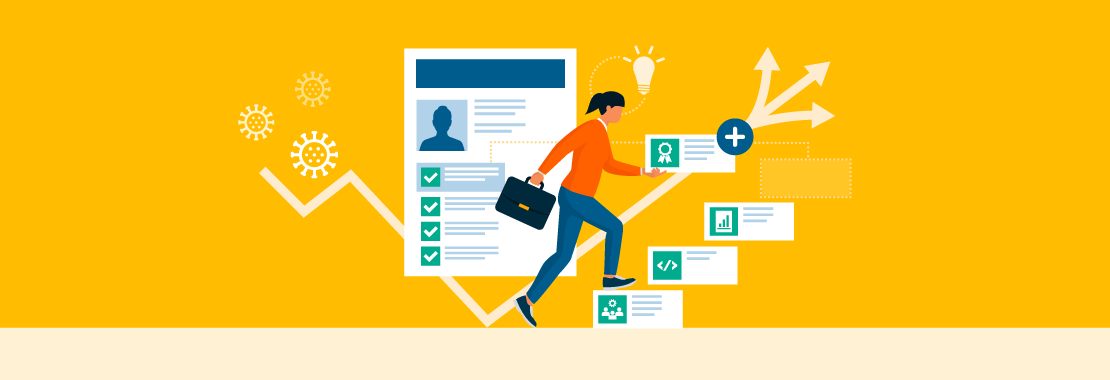Sara Glickman is a junior at Florida Atlantic University
Let’s be real: the pandemic has changed many aspects of everyday life—grocery shopping, attending school or work and even things as simple as seeing a friend. COVID-19 also changed many of our mindsets, goals and plans for the future. I can certainly tell you about my experience with that last one; COVID changed my career plans and led me down a path that I never would have imagined.
My Early Days
Growing up, I’d always wanted to be a doctor—specifically, a pediatrician. I’d walk around my house with a stethoscope and loved watching emergency room TV shows with my parents. I was enrolled in the Medical Sciences Academy throughout middle and high school, until one day in 10th grade when something inside me flipped—I no longer wanted to physically examine patients or be exposed to all those germs. I decided it wasn’t for me
anymore, and I started to look at other professions.
Junior year came, and I was enrolled in Advanced Placement Chemistry. Boy, did I love it. This is it, I thought, I’ll become a chemistry guru, go to pharmacy school, participate in research and cure disease! Some time passed, and this wasn’t for me either. I kept on looking. Computer science? No. Music production? No. Graphic design? No. It drove me absolutely insane, but I kept pushing.
Senior year came and I signed up for Advanced Placement Psychology. This is where I had my aha moment. As the school year went by, I explored all the different options for careers in psychology. I landed on neuropsychology research and started college at Florida Atlantic University as a Psychology major. Time went on and I wanted more science-based classes, so I changed my major to Neuroscience and Behavior. Right before the pandemic hit, I had settled on artificial intelligence and neural networks—but I still had a nagging feeling that this wasn’t exactly right for me.
The Pandemic Hits
As we all know, COVID-19 guidelines led to a widespread quarantine. Being stuck inside resulted in many people picking up all kinds of new hobbies and spending more time online. Since I was already using my computer for so many new things—like video chats and online classes—the internet quickly became my best friend and I went search engine happy. I was constantly Googling things and looking for more information on random topics I had heard about; I was hungry for knowledge. One night, during one of my Google surfs, I came across a video of the Navy’s indoor ocean, which they use to test ships against ocean currents. This video reminded me of one I saw of Air Force fighter pilots undergoing g-force training. The g-force training video then led me to a video of a space shuttle, and before long, I was deep into the world of aerospace and aviation. Historically, these little bouts of information adventures didn’t run too deep, but in this instance, I was hooked.
I quickly found my niche, which was commercial aviation and big airliners—those that fly civilian passengers around the country and internationally. I learned about plane spotting—spotting and identifying planes overhead or at airports—and took trips to my local airports to watch both big and small aircraft do their thing. The different airplane maneuvers and how pilots fly the planes interested me. This interest in aviation quickly turned into a passion, and everyone around me noticed, but I had absolutely no idea what I could do in the industry being a neuroscience major. Hours of research later, I found what seemed to be the perfect fit: Human Factors.
Human Factors is the intersection of Psychology and Engineering. It ensures that objects, systems and environments are designed with the human in mind, so we can work effectively and safely. I dove into the different career possibilities and what that could mean in the aviation industry. Cockpit design and aircraft safety sounded like a dream come true.
My New Path
Today, I’m well on my way to pursuing a career in Aviation Human Factors, and I’m proud to say that I currently work as a NASA intern. My goal is to finish my undergraduate degree in neuroscience, attend graduate school and hopefully someday leave my mark on history.
The pandemic has had so many impacts on so many people, positive and negative. I have faced some of the negative impacts myself, but I was fortunate to be surrounded by loved ones and a strong support system. COVID-19 drove the world into a whole new level of virtual settings and provided me with a new love for research. And it was through this new COVID-inspired hobby that I was led down a new career path and have ignited a great passion in my life.
Learn how college students feel about their education and its contribution to their career readiness in our 2021 Graduate Employability Report infographic.

